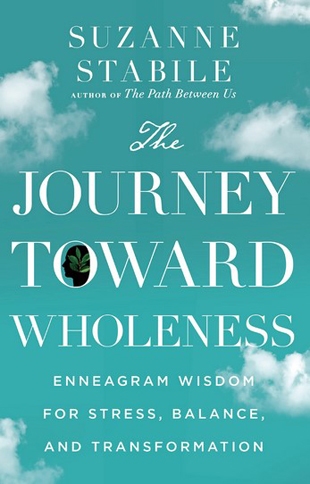Suzanne Stabile is one of the two or three real living authorities on the ancient personality typing system known as the Enneagram. She teaches and counsels widely, wrote The Path between Us (2018), and coauthored the bestseller, The Road Back to You (2016).
This book goes even deeper (see those earlier ones for a beginning approach) in three areas: understanding the differences in us and between us, understanding change, and recognizing and accepting transformation.
Most of all, the goal of Stabile’s writing and of using the Enneagram system is that one might find a more balanced way of life. She explains early on: “First, the key to living — in liminal time or any time — is balance. Second, we all have exactly what we need to find that balance.”
Then she explains that we are all born with “native intelligences” for thinking, feeling, and doing. And “Enneagram wisdom teaches us that these intelligences are simply three different ways of meeting the world.” The discovery comes in discerning which of these is dominant in us, which supports the dominant aspect, and which one is repressed.
Thinking = the head. Feeling = the heart. Doing = the gut. Stabile guides readers through these paths of discernment, with guidance on how to “name” what is yours, and how to “manage” the rest.
When she goes deeper, she asks the reader to take seriously intentionality in living. “But it’s really hard,” she acknowledges. She often uses herself as an example, for instance, by summarizing herself as an adopted child:
“The dynamics among the three centers [of native intelligence] means that (a) the preferred or 'dominant' center moves forward to interpret information that is received through the senses. Its values dominate the way information is processed (for me, this was feeling). (b) the 'support' center joins the dominant center in processing that information (in my case, doing). (c) the 'repressed' center is dormant and protected (for me, that was thinking).”
A page later, a grid of “Enneagram Centers of Intelligence and Stances” helps you better understand what lies dependent, withdrawing, and aggressive within you.
But most originally, Stabile looks at how we all have to learn better how to step into change — of ourselves and in the world around us. She looks at personal transformation not simply as an act of will and discipline, but just as often as something that happens to us (by God, perhaps), a transformation that we can help along by actually letting it happen.
Friends sometimes stand in the way. Stabile explains late in the book: “If you stick with this work [of personal cultivation, of soul], allowing personality to fall away while you seek to be more of who you truly are, it will very likely bring about some changes in your relationships. You may find out that some of the people you love and care about don’t want you to change and grow. They like you just like you are.”
